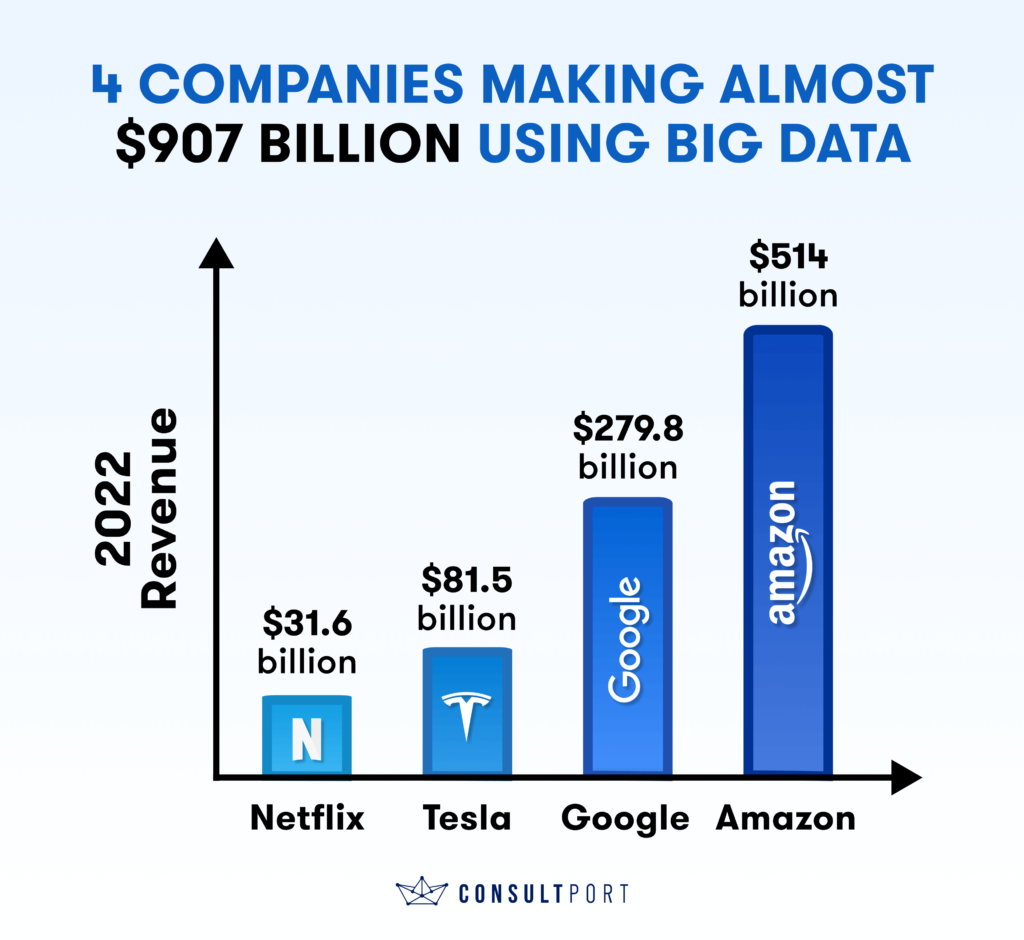4 Companies Making Almost $907 Billion Using Big Data
Blog Categories:
Published:
April 29, 2023
Reading Time:
7 minutes

You don’t have to be a data enthusiast to know the power of a data-driven strategy.
When it comes to data, the more you have, the more well-informed your business decisions can be. From boosting customer satisfaction to creating best-selling products, big data has the potential to make you billions! If you don’t believe it, take a look at the most successful companies and you’ll find that they have one thing in common—they take data very seriously.
Today, we'll take a look at 4 companies that are harnessing the power of big data and making almost $907 billion in revenue. From cutting-edge e-commerce websites to innovative car manufacturers, these companies have all harnessed the power of big data to dominate their industries and leave their competitors in the dust.
So, let's dive into it, and discuss how these companies are getting a huge return on investment from big data.
When it comes to data, the more you have, the more well-informed your business decisions can be. From boosting customer satisfaction to creating best-selling products, big data has the potential to make you billions! If you don’t believe it, take a look at the most successful companies and you’ll find that they have one thing in common—they take data very seriously.
Today, we'll take a look at 4 companies that are harnessing the power of big data and making almost $907 billion in revenue. From cutting-edge e-commerce websites to innovative car manufacturers, these companies have all harnessed the power of big data to dominate their industries and leave their competitors in the dust.
So, let's dive into it, and discuss how these companies are getting a huge return on investment from big data.

1. Google
Recent yearly revenue: $279.8 billion
Well, when it comes to anything data, Google always takes the first place. So, let’s start this article with “big daddy Google”. A data-driven company from the beginning, it has a market value of a trillion dollars—which is more than the annual GDP of many countries. And being the largest search engine in the world, Google massively relies on big data to maintain this top position.
Secondly, Google uses data to display targeted ads to its users for which advertisers pay billions to Google. According to Oberlo, Google ad revenue is expected to rise to $81 billion in 2024. This has got to be the most insane amount of money a company can make through data collection.
Finally, Google uses real-time data to enhance its services. Take Google Maps, as an example. You can simply write the name of your destination and Google will tell you the fastest route by analyzing real-time traffic flow. Amazing, isn’t it?
Well, when it comes to anything data, Google always takes the first place. So, let’s start this article with “big daddy Google”. A data-driven company from the beginning, it has a market value of a trillion dollars—which is more than the annual GDP of many countries. And being the largest search engine in the world, Google massively relies on big data to maintain this top position.
How does Google collect data?
Google is a total boss at collecting data! Every single day, the search engine giant gathers gigantic amounts of data from its users—everything from search queries to location and personal information from popular products, for example, Google Drive, Google Chrome, and Gmail. But don't worry, Google is pretty reliable and will keep your data safe. In fact, it’s necessary for Google to collect data in order to give you a personalized and seamless user experience.How does data collection benefit Google?
First, as mentioned before, Google uses personal data such as online behavior, preferences, and habits, to give its users a more personalized experience. You see, there is a reason why people use Chrome instead of the old Internet Explorer. Google knows exactly what users want and they offer it to them—and they can do it because they collect huge amounts of data.Secondly, Google uses data to display targeted ads to its users for which advertisers pay billions to Google. According to Oberlo, Google ad revenue is expected to rise to $81 billion in 2024. This has got to be the most insane amount of money a company can make through data collection.
Finally, Google uses real-time data to enhance its services. Take Google Maps, as an example. You can simply write the name of your destination and Google will tell you the fastest route by analyzing real-time traffic flow. Amazing, isn’t it?
KEY TAKEAWAYS
- A company doesn’t necessarily need to be a tech company to take full advantage of big data.
2. Amazon
Recent yearly revenue: $514 billion
Again, like Google, Amazon is a giant data-driven company that uses big data to enhance user experience, and, well, to make billions. Let’s understand how Amazon, a company with a brand value of more than $705 billion, makes the most of the data they collect.
And how can we forget Alexa? It’s a virtual assistant technology by Amazon that went viral. In 2019, more than 100 million Alexa-enabled devices were sold. When a user says something to Alexa, their voice is processed through Amazon servers. Alexa also knows what kind of products you buy, your favorite music and podcasts, and even the temperature of your room (depending on your settings and connectivity).
Amazon can also identify trends and patterns in user behavior. They can then develop new products and services in line with those trends. For example, if Alexa users are frequently asking about home workout products, Amazon may add more such products on its website.
Finally, data collection is really crucial to Amazon’s supply chain and logistics. By analyzing data on product demand, shipping times, and inventory levels, Amazon can ensure that it has the right products in stock at the right time. This results in faster shipping and happy customers.
Again, like Google, Amazon is a giant data-driven company that uses big data to enhance user experience, and, well, to make billions. Let’s understand how Amazon, a company with a brand value of more than $705 billion, makes the most of the data they collect.
How does Amazon collect data?
Amazon knows what you’ve purchased, when you purchased it, and how much money you spent. But wait, there’s more. After the purchase is completed, customers often leave reviews and ratings. This data is also considered to be extremely valuable by Amazon and is always collected.And how can we forget Alexa? It’s a virtual assistant technology by Amazon that went viral. In 2019, more than 100 million Alexa-enabled devices were sold. When a user says something to Alexa, their voice is processed through Amazon servers. Alexa also knows what kind of products you buy, your favorite music and podcasts, and even the temperature of your room (depending on your settings and connectivity).
How does data collection benefit Amazon?
Have you ever fallen down the rabbit hole of Amazon product recommendations? Well, you’re not the only one. Amazon collects purchase-related data to recommend similar products to you. As you may imagine, this can massively increase sales.Amazon can also identify trends and patterns in user behavior. They can then develop new products and services in line with those trends. For example, if Alexa users are frequently asking about home workout products, Amazon may add more such products on its website.
Finally, data collection is really crucial to Amazon’s supply chain and logistics. By analyzing data on product demand, shipping times, and inventory levels, Amazon can ensure that it has the right products in stock at the right time. This results in faster shipping and happy customers.
3. Netflix
Recent yearly revenue: $31.6 billion
Most of us see Netflix as a way to relax and get entertained. But did you know that Netflix is a data-driven company and massively relies on user data to stay ahead of the competition? By gathering and analyzing massive amounts of information, Netflix, like Google and Amazon, is an enormous data factory. Let’s understand how Netflix uses data.
Netflix's data-driven approach enables the company to create personalized recommendations for each user, improving their overall customer experience. By providing tailored content suggestions, Netflix is able to increase engagement and retention, which, in turn, leads to higher revenue.
The company’s success can be attributed to its data-driven approach, which helped it make informed decisions about which content to produce. What’s more, this approach allows the company to allocate its resources more strategically. By analyzing data on user behavior and preferences, Netflix can make strategic decisions about which markets to enter and which types of content to prioritize.
Most of us see Netflix as a way to relax and get entertained. But did you know that Netflix is a data-driven company and massively relies on user data to stay ahead of the competition? By gathering and analyzing massive amounts of information, Netflix, like Google and Amazon, is an enormous data factory. Let’s understand how Netflix uses data.
How does Netflix collect data?
Netflix has a really cool way of understanding what we want to watch! The streaming giant collects data from various sources, like when we browse the platform, search for something specific, or watch a show or movie. A user’s browsing history, search queries, and watch history are some crucial pieces of data that Netflix collects. They also know whether you access Netflix using a phone, a computer, a TV, or a tablet. Besides this, they also keep track of our IP address as well as your rough location at each login.How does data collection benefit Netflix?
Do you know how many people are subscribed to Netflix? According to Statista, as of the fourth quarter of 2022, Netflix had nearly 231 million paid subscribers worldwide. Furthermore, most subscribers are based in the EMEA region, which stands for Europe, the Middle East, and Africa. In fact, over 76 million of Netflix's total global subscriber base is located in this area.Netflix's data-driven approach enables the company to create personalized recommendations for each user, improving their overall customer experience. By providing tailored content suggestions, Netflix is able to increase engagement and retention, which, in turn, leads to higher revenue.
The company’s success can be attributed to its data-driven approach, which helped it make informed decisions about which content to produce. What’s more, this approach allows the company to allocate its resources more strategically. By analyzing data on user behavior and preferences, Netflix can make strategic decisions about which markets to enter and which types of content to prioritize.
4. Tesla
Recent yearly revenue: $81.5 billionAlright, now let’s change the pattern a bit. All the companies that we discussed so far are tech and media companies. Now, let’s understand how a company can benefit from data even if it’s not necessarily a tech company, but rather an automobile manufacturer like Tesla.
How does Tesla collect data?
The detailed customer privacy notice which is published on Tesla’s official website explains how the company collects data. Tesla's commitment to protecting its customers' privacy is evident in how it collects data. A Tesla car generates a wealth of information, including vehicle, diagnostic, and infotainment system data. However, Tesla does not link this information with the driver’s identity or account by default. So, personal information, such as a driver’s location or a history of where they've been, is kept private.Additionally, the owner’s in-vehicle experiences are also protected, and all infotainment data collected is kept separate from their identity or account. Owners have complete control over their data-sharing preferences, and Tesla will only share their personal data when necessary or with their explicit permission.
How does data collection benefit Tesla?
Tesla uses the data collected from its customers for various purposes that ultimately benefit them. For example, Tesla can use this data to contact its customers and offer them important safety-related information or notify first responders in case of an accident involving their vehicle. So, if a Tesla vehicle gets into an accident, the authorities can get important life-saving information that helps the driver.Additionally, by analyzing the data collected, Tesla can improve its products and services to make them even better for the customers. The company can also use the information for business purposes such as data analytics and fraud monitoring and prevention. Overall, the data collected allows Tesla to provide a more seamless and personalized experience for its customers.
This makes Tesla cars one of the most sought-after vehicles in the world. Not many car manufacturers are capable of using data in such an intelligent way, and that’s the reason why it's hard to compete with a Tesla.
How to Start Your Company’s Data Journey?
Hope that now you know that data, if used correctly, can make you billions. Of course, there are lots of other factors involved. However, as we saw in the article, data can really help you understand your customers better, develop popular products, and increase revenue. Now you may be wondering: How can I get started with data?
Well, here at Consultport, we have the world’s leading data analytics consultants in our talent pool. Whether you need help with data strategy, architecture, or analysis, we’ve got you covered. Furthermore, with our lightning-fast turnaround time, we can connect you with top-tier data scientists and analysts in a matter of days.
So why wait? Get in touch with us today and start your journey towards millions in revenue with data-driven insights!
Well, here at Consultport, we have the world’s leading data analytics consultants in our talent pool. Whether you need help with data strategy, architecture, or analysis, we’ve got you covered. Furthermore, with our lightning-fast turnaround time, we can connect you with top-tier data scientists and analysts in a matter of days.
So why wait? Get in touch with us today and start your journey towards millions in revenue with data-driven insights!
Share This Story, Choose Your Platform!



